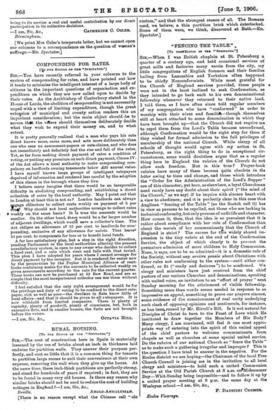"FENCING THE TABLE." • [To TRISEDITOR OP P11 " SPROTATOR.1
SIR,,—When I was British chaplain at St. Petersburg a quarter of a century ago, and held occasional services at'
great mills and factories many versts from the city, my little congregations of English foremen and their families hailing from Lancashire and Yorkshire often happened to be chiefly Nonconformists. While most grateful for the Church of England services provided, these people • were not in the least inclined to seek Confirmation, as they intended to go back each to his own denominational fellowship whenever they returned to their native land.
I told them, as I have often since told regular members of my congregation who have " conformed " in order to worship with their wives and families—though themselves still at heart attached to some denomination in which they have been brought up—that the Church did not require me to repel them from the Lord's Table because unconfirmed, although Confirmation would be the right step for them if they wished for formal admission to the full privileges of membership of the national Church. While clergy of all schools of thought would agree with my action in St. Petersburg, as the right thing to do in exceptional cir- cumstances, some would doubtless argue that as a regular thing here in England the rubrics of the Church do not allow such freedom. But is this true ? Prayer-book rubrics have many of them become quite obsolete in the letter owing to time and change, and those which introduce the "Order for the Administration of the Lord's Supper" are of this character; yet here, as elsewhere, a loyal Churchman need rarely have any doubt about their spirit (" the mind of the Church," as we say) if he inquire with sincere heart with a view to obedience; and it is perfectly clear in this case that Anglican "fencing of the Table" (as the Scotch call it) has in view as persons to be repelled, not those who are lacking in technical conformity, but only persons of un fit life and character. How comes it, then, that the idea is so prevalent that it is rather about compliance with her rule of Confirmation than about the morals of her communicants that the Church of England is strict ? The excuse for teis widely shared im- pression is the tiny rubric at the end of the Confirmation Service, the object of which clearly is to prevent the premature admission of mere children to Holy Communion. None, it says, are to he so admitted—it is a domestic rule of the Society, without any arriere pensge about Christians with other rules not conforming to the system—until either con- firmed, or fit (" ready and desirous ") to be confirmed. We clergy and ministers have just received from the chief pastors of our various Churches and denominations, speaking with united voice, an invitation to an "effort of prayer" next Sunday morning for the attainment of visible fellowship. Something more than words seems needed in response to so impressive an appeal, something to prove our prayers sincere, some evidence of the consciousness of real unity underlying such clash of opposing opinions and sentiments, for instance, as has been,,roused by Mr. Birrell's Bill. Is it not natural for Disciples of Christ to turn to the Feast of Love which He instituted to draw together the Members of His Body ? Many clergy, I am convinced, will feel it one most appro- priate way of entering into the spirit of this united appeal of the chief pastors to welcome communicants from chapels as well as churches at some special united service. Do the rubrics of our national Church so "fence the Table" as to make such a gathering irregular and improper ? This is the question I have tried to answer in the negative. For the Eccles district we are hoping—the Chairman of the local Free Church Council is joining me in the invitation to all local clergy and ministers—to hold such a united Communion Service at the Old Parish Church at 8 a.m. ontridstimmer Day—Whit-Sunday being impossible—and to follow it up by a united prayer meeting at 8 p.m. the same day at the Wesleyan school.—I am, Sir, &c.,
Eccles Vicarage. F. DAUSTINI OREHER.






































 Previous page
Previous page